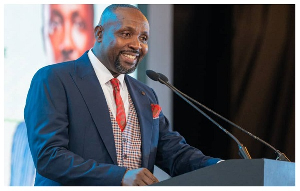


DC Kwame Kwakye Blog of Tuesday, 12 November 2024
Source: KWAME KWAKYE
Breaking the Silence: Understanding and Supporting Mental Health

In recent years, conversations around mental health have grown louder and more visible. While there has been progress in awareness and understanding, millions still struggle in silence, battling anxiety, depression, and other mental health challenges without the support they need. As mental health issues rise across all age groups, it is crucial to foster open dialogue, reduce stigma, and improve access to effective treatment and support systems.
According to the World Health Organization (WHO), one in four people worldwide will experience a mental health issue at some point in their lives. Anxiety disorders, depression, and substance abuse are some of the most prevalent conditions, often going untreated due to stigma, lack of resources, or limited mental health services. The COVID-19 pandemic further exacerbated these challenges, leading to increased isolation, job insecurity, and grief, all of which have fueled a global mental health crisis.
Youth and young adults have been particularly affected. Suicide remains one of the leading causes of death among young people, underscoring the urgent need for preventative care and accessible mental health resources. Similarly, older adults, especially those facing isolation, are vulnerable to depression and anxiety, yet they often receive less attention in mental health discussions.

Despite increasing awareness, stigma remains one of the biggest barriers to mental health care. Many people fear judgment or discrimination if they disclose their struggles, leading them to suffer alone. In the workplace, mental health issues are often misunderstood or downplayed, leaving employees reluctant to seek help or take time off to address their mental health needs.

This stigma is even more pronounced in certain cultures and communities where mental health issues may be viewed as signs of weakness or moral failure rather than medical conditions that require care and support. To change this, societies must embrace the message that mental health is just as vital as physical health, and that seeking help is a sign of strength, not vulnerability.
Mental health experts emphasize that early intervention can significantly improve outcomes for individuals struggling with mental health issues. Unfortunately, many people delay seeking help due to a lack of awareness about symptoms or a lack of accessible resources. Educating communities about the warning signs of mental health issues—such as persistent sadness, social withdrawal, or extreme mood swings—can encourage earlier intervention and support.
Schools and workplaces are increasingly recognizing their role in promoting mental health awareness. Mental health programs in educational settings help children and young adults learn about self-care, resilience, and how to seek help when needed. Likewise, workplaces that prioritize mental health through supportive policies, counseling, and flexible work arrangements foster healthier environments where employees feel supported and valued.
Access to mental health care remains a significant challenge for many. Long wait times, high costs, and a shortage of mental health professionals are common obstacles. In rural areas and low-income communities, these challenges are even more pronounced, leaving some without any accessible options. Governments and healthcare providers must address these disparities by expanding telehealth services, providing subsidies for mental health care, and training more mental health professionals to meet growing demand.
Telehealth has proven to be a valuable tool, allowing people to access therapy and counseling remotely. Additionally, digital mental health platforms, support apps, and community hotlines provide valuable support and resources for individuals who may not have traditional care options. However, digital solutions are not a replacement for the need to invest in comprehensive mental health services that are affordable and accessible to all.
A Path Forward
The journey toward mental health awareness and support is ongoing, but progress is being made. Open conversations, education, and policy changes can create an environment where mental health is seen as a priority rather than an afterthought. Everyone has a role to play—whether by supporting friends and family, advocating for better mental health policies, or challenging the stigma that still surrounds mental illness.
Mental health affects every aspect of a person’s life, from their relationships to their work and overall well-being. By prioritizing mental health, we not only help individuals lead healthier lives, but we also strengthen our communities, reduce healthcare costs, and create a more compassionate society.
In a world that often emphasizes physical wellness, it is time to recognize that mental health deserves equal attention. With continued advocacy, investment, and awareness, we can build a future where everyone has the support they need to lead fulfilling lives, free from the shadows of mental health stigma.
By Prince Agyei Opoku


















